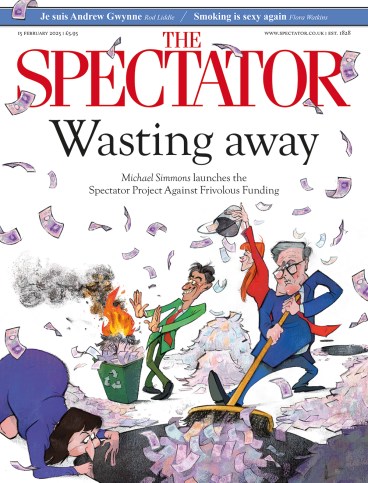
There is something wonderful about a novel being rescued from obscurity. Robert Plunket’s My Search for Warren Harding was first published in 1983, given a few decent reviews and then disappeared. Occasionally admirers – including rather influential ones like Amy Sedaris and Larry David – would lend a weathered copy to friends, insisting they read it. And so here we are.
Elliot Weiner, a third-rate academic (in fact the word ‘academic’ barely seems to apply), hears that Rebekah Kinney, a former mistress of Warren G. Harding, president of the United States from 1921 to 1923, is living in a decrepit mansion in Los Angeles. Weiner specialises in Harding, largely because no one else much seems to, and his plan is to somehow inveigle himself into Kinney’s favour and grill her, although he hears she is ‘real old, real mean and dumb – dumb like a fox’. There are rumours of a cache of letters – with luck full of pornographic detail.
The plot is taken from Henry James’s The Aspern Papers; and, as James put it at the beginning of that novel: ‘The way to become an acquaintance was first to become an inmate.’ Weiner and a co-conspirator, spying on the mansion with a pair of binoculars and a Polaroid camera, discover that a small property in the grounds – which turns out to be a pool house – is vacant and free to rent.
We soon realise that the narrator is a jerk. Of his only other competitor, he says: ‘I will be the first to admit that [his] contributions to Hardingania have been tremendous, and that the charges of speciousness that are occasionally levelled against his work are largely unmerited.’ Actually we have already begun to suspect from the bogus acknowledgments that something is wrong with Weiner: ‘Certain events pertinent to my researches have subsequently given rise to an array of sordid litigations.’ One rubs one’s hands in anticipation.
I am reminded of Lolita. A nasty person with a fancy prose style teaches us about America
And one is not disappointed. Weiner, in the grand tradition of the comic unreliable narrator, reveals himself to be a half-insane monster: petty, unscrupulous, snobbish, racist, homophobic and what is today called fat-phobic. Determined to unearth the letters, he is driven into the arms of Jonica, Kinney’s granddaughter, who is practically obese but who may help him in his quest. And of course we work out that the homophobic Weiner is in fact a closet gay.
The book is a sensitivity reader’s bad dream – and all the better for it. Plunket knows what he’s doing (he is gay himself) and piles on the cruelty when he makes his protagonist a native New Yorker. At one point, Weiner laments his exile: ‘There is life outside of that pool house on Casino Drive. Remember Bloomingdale’s? Remember rain? Remember Dannon Yogurt? Remember Zabar’s?’ But it is remarkable that a figure who spends his time bitching about everyone and everything should be in a way so joyous. While Weiner hates the Los Angeles sunshine, we bask in it. (It is also true that the characters he mocks are largely deserving of contempt.)
My Search for Warren Harding is essentially a picaresque novel and, as in all such works, we meet with grotesques. I am reminded of Lolita. A nasty person with a fancy prose style teaches us about America. Taken to see a dismal play (its title, All My Sisters Slept in Dirt: A Choral Poem, tells you pretty much all you need to know), Weiner observes the audience: ‘It hit me what an important moment in feminist fashion it was when Gloria Steinem dropped by her optician’s and said: “I’ll take those.’’’
That’s the thing about a certain kind of bitchiness: it’s rarely dull. And the fact that one knows (since reading the words ‘sordid litigations’) that the stash of Harding’s ‘filthy’ letters will remain out of Weiner’s reach makes it all even more exquisite.








Comments